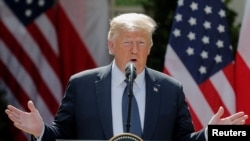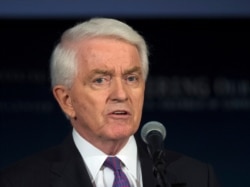President Donald Trump’s executive order this week to extend and expand a ban on issuing visas to certain classes of foreign workers — ostensibly to preserve 525,000 jobs for hard-pressed American workers — was celebrated by advocates of decreased immigration.
“Given the powerful moneyed interests demanding continued importation of foreign workers — and the many influential administration officials who share those views — Monday’s announcement was a real win,” wrote Mark Krikorian, executive director of the Center for Immigration Studies, a Washington think tank dedicated to reducing immigration.
But business leaders and economists worry that in addition to doing short-term damage to some sectors of the U.S. economy, it could also make talented professionals from overseas less willing to relocate to the United States in the future.
'Gross misunderstanding'
“It reflects the administration's gross misunderstanding of the way the modern American economy works and has worked for some decades now,” said Edward Alden, a senior fellow at the Council on Foreign Relations in Washington, D.C. “It's hard to call it anything other than ignorant.”
The announcement, couched in a presidential proclamation, lengthened a ban put in place earlier this year on issuing entry visas for immigrants seeking lawful permanent resident status through the end of the year.
In addition, the administration will now halt the issuance of a wide variety of nonimmigrant visas, also through December, including the H-1B skilled worker visa much relied upon by the U.S. high-tech industry, and L visas, which allow companies to bring existing foreign-national employees into the country.
Also affected by the ban are H-2B visas, which allow nonagricultural unskilled laborers to enter the country, and J visas, which are commonly used by foreigners coming to the U.S. temporarily to work as camp counselors and au pairs, or to participate in training programs.
In his proclamation, Trump indicated that he was restricting immigration as a reaction to the mass unemployment that has resulted from business closings related to the ongoing coronavirus pandemic.
“Under the extraordinary circumstances of the economic contraction resulting from the COVID-19 outbreak, certain nonimmigrant visa programs authorizing such employment pose an unusual threat to the employment of American workers,” the proclamation said.
However, the announcement was widely denounced by pro-business groups and industry associations.
“Today’s proclamation is a severe and sweeping attempt to restrict legal immigration,” U.S. Chamber of Commerce CEO Thomas J. Donohue said in a statement. “Putting up a ‘not welcome’ sign for engineers, executives, IT experts, doctors, nurses and other workers won’t help our country, it will hold us back. Restrictive changes to our nation’s immigration system will push investment and economic activity abroad, slow growth, and reduce job creation.”
Many economists criticized the administration’s move as counterproductive.
'Study after study after study'
Alden, of the Council on Foreign Relations, added: “There's study after study after study that shows bringing in talented foreign employees, particularly in science and technology-related fields, boosts innovation. It boosts productivity. It ends up creating more jobs for Americans than are taken away. ... So the net impact of this is going to be negative on job growth for Americans, particularly in the most dynamic sectors of the economy.”
Some experts questioned the practical impact that the ban would have, given the state of international travel in the time of a global pandemic.
“In case the administration hasn’t noticed, the immigration system is already shut down, almost entirely, as a result of the pandemic,” said Daniel Costa, an attorney with the Economic Policy Institute in Washington.
“Considering the number of new coronavirus infections continues to increase rapidly in the United States and abroad, it’s difficult to imagine the immigration system opening back up anytime soon,” Costa wrote in an analysis published Tuesday.
“Would any of the banned visas have been issued in these programs before the end of the year absent this proclamation? I’m not convinced they would have.”
Alden said that the potential damage from the new policy extends far beyond the short-term effects, and could persist even in the event the Trump administration leaves office in January of next year.
Many high-tech workers who come to the United States do so with the expectation that they will be building a life here for themselves, their spouses and children.
Search for stability
Even if the Trump administration’s proclamation were allowed to expire at the end of the year, and a more immigrant-friendly administration took control in January, that might be small comfort for a talented engineer looking to relocate his or her family. The knowledge that, four years later, another administration might reinstitute immigration restrictions could cause him or her to look to a country with a more stable immigration policy.
“If you're a talented scientist or engineer, your prospects here are better than they are anywhere else in the world, and that has been a powerful magnet,” Alden said. “But weighed against that is an immigration system that is difficult to navigate at the best of times, and is getting far more unpredictable and more capricious.”
While there is no evidence that the U.S. is currently losing out on top talent, Alden said there must be a “tipping point.”
“You have to think that the truly best and the brightest, the ones who really can choose where in the world they want to work, are increasingly going to say there just isn't a stable future for me in the United States, so I'm going to look for opportunities elsewhere,” he said.






